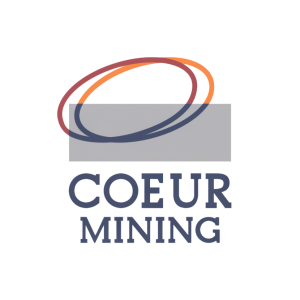Coeur Reports Year-End 2023 Mineral Reserves and Resources
Expansion drilling success drove strong resource growth at all assets
Measured and indicated resources totaled 3.2 million ounces of gold, 196.3 million ounces of silver, 1,517 million pounds of zinc and 768.7 million pounds of lead, reflecting year-over-year increases for all metals driven by additions at Palmarejo,
Inferred resources were 2.0 million ounces of gold, 92.5 million ounces of silver, 481.8 million pounds of zinc and 199.8 million pounds of lead, signifying year-over-year increases of approximately
Key Highlights1
-
Rochester increased total reserve tonnage for second consecutive year, leading to a23% increase in mine life to 16 years – Pit design optimization drove a10% increase in reserve tons to a total of 510 million tons, which drove silver and gold reserve increases of7% and6% , respectively, to 192.9 million ounces of silver and 1.2 million ounces of gold. Additionally, silver and gold measured and indicated resources increased16% and15% , respectively, while silver inferred resources increased76% to 46.0 million ounces and gold inferred resources increased80% to 267,000 ounces -
Kensington successfully replaced 2023 gold production and boosted inferred resources by11% – Infill, expansion and scout drilling contributed to reserve replacement that positionsKensington for expected future mine life extensions beginning in 2024 from its multi-year development and drilling program. Expansion of Kensington Zone 30 and Elmira remain key targets for future reserve growth -
Resource expansion program at Palmarejo led to double digit resource growth – The top exploration priority at Palmarejo in 2023 was resource expansion, which was achieved with a
13% and15% increase in gold and silver measured and indicated resources, respectively, as well as a6% increase in silver inferred resources. Palmarejo ended 2023 with gold and silver reserves of 770,000 ounces and 51.0 million ounces, respectively -
Double digit resource growth at Wharf positions it for potential reserve growth in 2024 – Wharf’s measured and indicated resources increased
70% and year-end 2023 gold reserves totaled 760,000 ounces, or a 6-year mine life - Continued resource growth at Silvertip – After resuming drilling in July 2023, exploration success in the Southern Silver zone and Saddle Zone led to an increase across all resource classes resulting in 7.2 million tons of measured and indicated resources and 2.3 million tons of inferred resources of silver, zinc and lead at one of the world’s highest grade polymetallic deposits
“In a year when completing Rochester’s expansion was our top priority, it’s fitting that it led the way with strong reserve and resource growth in 2023,” said Mitchell J. Krebs, President and Chief Executive Officer. “Coeur’s total exploration investment in 2023 was lower than in recent years and resource expansion was our primary goal for the year, which was achieved across all of our sites. Organic growth through elevated levels of exploration investment has been a defining characteristic of Coeur over the last several years, and our commitment to reserve and resource growth through the drill bit will continue in 2024.”
Coeur’s gold and silver price assumptions for year-end 2023 reserves remained unchanged year-over-year at
About Coeur
Coeur Mining, Inc. is a
Cautionary Statements
This news release contains forward-looking statements within the meaning of securities legislation in
The scientific and technical information concerning our mineral projects in this news release have been reviewed and approved by a “qualified person” under Item 1300 of Regulation S-K under the Securities Exchange Act of 1934, as amended (“SK 1300”), namely our Senior Director, Technical Services, Christopher Pascoe. For a description of the key assumptions, parameters and methods used to estimate mineral reserves and mineral resources for Coeur’s material properties included in this news release, as well as data verification procedures and a general discussion of the extent to which the estimates may be affected by any known environmental, permitting, legal, title, taxation, sociopolitical, marketing or other relevant factors, please review the Technical Report Summaries for each of the Company’s material properties which are available at www.sec.gov.
Notes
The potential quantity and grade for the deposits described herein are conceptual in nature. There is insufficient exploratory work to define a mineral resource and it is uncertain if further exploration will result in the applicable target being delineated as a mineral resource.
- 2023 reserves and resources were determined in accordance with Item 1300 of SEC Regulation S-K. Reserves and resources for certain prior periods were determined in accordance with Canadian National Instrument 43-101. Both sets of reporting standards have similar goals in terms of conveying an appropriate level of confidence in the disclosures being reported, but the standards embody slightly different approaches and definitions.
2023 Year-End Proven and Probable Reserves
| Grade | Contained | |||||
| Gold | Silver | Gold | Silver | |||
| Short tons | (oz/t) | (oz/t) | (oz) | (oz) | ||
| PROVEN RESERVES | ||||||
| Palmarejo | 4,203,000 |
0.060 |
4.21 |
252,000 |
17,698,000 |
|
465,919,000 |
0.002 |
0.38 |
1,135,000 |
177,472,000 |
||
1,009,000 |
0.186 |
- |
188,000 |
- |
||
| Wharf | 5,931,000 |
0.032 |
- |
188,000 |
- |
|
| Total | 477,062,000 |
0.004 |
0.41 |
1,763,000 |
195,170,000 |
|
| PROBABLE RESERVES | ||||||
| Palmarejo | 8,580,000 |
0.060 |
3.88 |
517,000 |
33,283,000 |
|
44,524,000 |
0.002 |
0.35 |
104,000 |
15,413,000 |
||
1,109,000 |
0.201 |
- |
223,000 |
- |
||
| Wharf | 21,318,000 |
0.027 |
- |
575,000 |
- |
|
| Total | 75,531,000 |
0.019 |
0.64 |
1,418,000 |
48,695,000 |
|
| PROVEN AND PROBABLE RESERVES | ||||||
| Palmarejo | 12,783,000 |
0.060 |
3.99 |
769,000 |
50,981,000 |
|
510,443,000 |
0.002 |
0.38 |
1,238,000 |
192,885,000 |
||
2,119,000 |
0.194 |
- |
411,000 |
- |
||
| Wharf | 27,249,000 |
0.028 |
- |
764,000 |
- |
|
| Total | 552,594,000 |
0.006 |
0.44 |
3,182,000 |
243,865,000 |
|
Notes to above Mineral Reserves:
- Certain definitions: The term “reserve” means that part of a mineral deposit that can be economically and legally extracted or produced at the time of the reserve determination. The term “proven (measured) reserves” means reserves for which (a) quantity is computed from dimensions revealed in outcrops, trenches, workings or drill holes, grade and/or quality are computed from the results of detailed sampling; and (b) the sites for inspection, sampling and measurements are spaced so closely and the geologic character is sufficiently defined that size, shape, depth and mineral content of reserves are well established. The term “probable (indicated) reserves” means reserves for which quantity and grade and/or quality are computed from information similar to that used for proven (measured) reserves, but the sites for inspection, sampling and measurement are farther apart or are otherwise less adequately spaced. The degree of assurance, although lower than that for proven (measured) reserves, is high enough to assume continuity between points of observation. The term “cutoff grade” means the lowest grade of mineralized material considered economic to process. Cutoff grades vary between deposits depending upon prevailing economic conditions, mineability of the deposit, by-products, amenability of the mineralized material to silver or gold extraction and type of milling or leaching facilities available.
- The Mineral Reserve estimates are current as of December 31, 2023, are reported using the definitions in Item 1300 of Regulation S-K and were prepared by the Company’s technical staff.
-
Assumed metal prices for 2023 Mineral Reserves were
$21.00 $1,600 $1.15 $0.95 Kensington at$1,850 -
Palmarejo Mineral Reserve estimates use the following key input parameters: assumption of conventional longhole underground mining; reported above a variable gold equivalent cut-off grade that ranges from 2.11–2.97 g/t AuEq and an incremental development cut-off grade ranging from 1.16–1.55 g/t AuEq; metallurgical recovery assumption of
92.0% for gold and83.0% for silver; mining dilution assumes 0.4–1.1 meter of hanging/foot wall waste dilution; mining loss of15% was applied; variable mining costs that range fromUS .72–US$44 $85.71 /tonne, surface haulage costs ofUS /tonne, process costs of$4.92 US /tonne, general and administrative costs of$32.70 US /tonne, and surface/auxiliary support costs of$14.06 US /tonne. Excludes the impact of the Franco-Nevada gold stream agreement at Palmarejo in calculation of Mineral Reserves. No assurances can be given that all mineral reserves will be mined, as mineralized material that may qualify as reserves under applicable standards by virtue of having positive economics may not generate attractive enough returns to be included in our mine plans, due to factors such as the impact of the gold stream at Palmarejo. As a result, we may elect not to mine portions of the mineralized material reported as reserves.$3.18 -
Rochester Mineral Reserve estimates are tabulated within a confining pit design and use the following input parameters:
Rochester oxide variable recovery Au = 77.7–85.9% and Ag = 59.4-61.0% ;Rochester sulfide variable recovery Au = 15.2–77.7% and Ag = 0.0–59.4% ; with a net smelter return cutoff of$3.01 US /st sulfide; Nevada Packard oxide recovery Au =$3.11 92.0% and Ag =61.0% ; with a net smelter return cutoff of$5.51 -
Kensington Mineral Reserve estimates use the following key input parameters: assumption of conventional underground mining; gold price of
$1,850 93.5% ; gold payability of97.5% ; mining dilution of20% ; mining loss of12% was applied; mining costs ofUS /ton mined; process costs of$103.67 US /ton processed; general and administrative costs of$55.06 US /ton processed; Sustaining capital$55.37 US /ton processed; and concentrate refining and shipping costs of$4.50 US /oz sold.$108.67 -
Wharf Mineral Reserve estimates use the following key input parameters: assumption of conventional open pit mining; reported above a gold cut-off grade of 0.010 oz/ton Au; average metallurgical recovery assumption of
79.0% ; royalty burden ofUS /oz Au; pit slope angles that vary from 34–50º; mining costs of$64 US /ton mined, process costs of$2.44 US /ton processed (includes general and administrative costs).$11.71 - Rounding of short tons, grades, and troy ounces, as required by reporting guidelines, may result in apparent differences between tons, grades, and contained metal contents.
2023 Year-End Measured and Indicated Resources
| Grade | Contained | ||||||||
| Gold | Silver | Zinc | Lead | Gold | Silver | Zinc | Lead | ||
| Short tons | (oz/t) | (oz/t) | (%) | (%) | (oz) | (oz) | (lbs) | (lbs) | |
| MEASURED RESOURCES | |||||||||
| Palmarejo | 5,674,000 |
0.070 |
4.56 |
- |
- |
396,000 |
25,875,000 |
- |
- |
110,460,000 |
0.002 |
0.29 |
- |
- |
200,000 |
31,587,000 |
- |
- |
|
1,653,000 |
0.289 |
- |
- |
- |
477,000 |
- |
- |
- |
|
| Wharf | 1,666,000 |
0.024 |
- |
- |
- |
40,000 |
- |
- |
- |
| Silvertip | 734,000 |
- |
10.56 |
|
|
- |
7,749,000 |
145,703,000 |
115,648,000 |
| Lincoln Hill | 4,642,000 |
0.012 |
0.34 |
- |
- |
58,000 |
1,592,000 |
- |
- |
| Total | 124,828,000 |
0.009 |
0.54 |
1,171,000 |
66,803,000 |
145,703,000 |
115,648,000 |
||
| INDICATED RESOURCES | |||||||||
| Palmarejo | 15,500,000 |
0.060 |
3.85 |
- |
- |
926,000 |
59,701,000 |
- |
- |
27,170,000 |
0.002 |
0.41 |
- |
- |
47,000 |
11,237,000 |
- |
- |
|
1,278,000 |
0.268 |
- |
- |
- |
342,000 |
- |
- |
- |
|
| Wharf | 22,150,000 |
0.021 |
- |
- |
- |
458,000 |
- |
- |
- |
| Silvertip | 6,418,000 |
- |
7.78 |
|
|
- |
49,919,000 |
1,371,074,000 |
653,008,000 |
| Lincoln Hill | 27,668,000 |
0.011 |
0.31 |
- |
- |
306,000 |
8,655,000 |
- |
- |
| Total | 100,184,000 |
0.021 |
1.29 |
2,078,000 |
129,512,000 |
1,371,074,000 |
653,008,000 |
||
| MEASURED AND INDICATED RESOURCES | |||||||||
| Palmarejo | 21,174,000 |
0.062 |
4.04 |
- |
- |
1,321,000 |
85,576,000 |
- |
- |
137,630,000 |
0.002 |
0.31 |
- |
- |
247,000 |
42,824,000 |
- |
- |
|
2,931,000 |
0.279 |
- |
- |
- |
819,000 |
- |
- |
- |
|
| Wharf | 23,816,000 |
0.021 |
- |
- |
- |
498,000 |
- |
- |
- |
| Silvertip | 7,152,000 |
- |
8.06 |
|
|
- |
57,668,000 |
1,516,777,000 |
768,657,000 |
| Lincoln Hill | 32,310,000 |
0.011 |
0.32 |
- |
- |
364,000 |
10,247,000 |
- |
- |
| Total | 225,012,000 |
0.014 |
0.87 |
3,249,000 |
196,315,000 |
1,516,777,000 |
768,657,000 |
||
2023 Year-End Inferred Resources
| Grade | Contained | ||||||||
| Gold | Silver | Zinc | Lead | Gold | Silver | Zinc | Lead | ||
| Short tons | (oz/t) | (oz/t) | (%) | (%) | (oz) | (oz) | (lbs) | (lbs) | |
| INFERRED RESOURCES | |||||||||
| Palmarejo | 4,207,000 |
0.091 |
4.50 |
- |
- |
381,000 |
18,933,000 |
- |
- |
135,104,000 |
0.002 |
0.34 |
- |
- |
267,000 |
45,959,000 |
- |
- |
|
1,567,000 |
0.248 |
- |
- |
- |
388,000 |
- |
- |
- |
|
| Wharf | 7,125,000 |
0.021 |
- |
- |
- |
149,000 |
- |
- |
- |
| Silvertip | 2,345,000 |
- |
6.86 |
|
|
- |
16,084,000 |
481,791,000 |
199,815,000 |
| Lincoln Hill | 22,952,000 |
0.011 |
0.36 |
- |
- |
255,000 |
8,163,000 |
- |
- |
| Wilco | 25,736,000 |
0.021 |
0.13 |
- |
- |
531,000 |
3,346,000 |
- |
- |
| Total | 199,037,000 |
0.010 |
0.46 |
1,971,000 |
92,485,000 |
481,791,000 |
199,815,000 |
||
Notes to above Mineral Resources:
- Certain definitions: The term “resource” means that it is a concentration or occurrence of material of economic interest in or on the Earth’s crust in such form, grade or quantity that there are reasonable prospects for economic extraction. Inferred, Indicated, and Measured resources are in order of increasing confidence based on level of underlying geological evidence. The term ‘inferred resource’ is that part of a mineral resource for which quantity and grade or quality are estimated on the basis of limited geological evidence and sampling. The term “limited geological evidence” means evidence that is only sufficient to establish that geological and grade or quality continuity is more likely than not. The level of geological uncertainty associated an inferred mineral resource is too high to apply relevant technical and economic factors likely to influence the prospects of economic extraction in a manner useful for evaluation of economic viability and must have a reasonable expectation that the majority of inferred mineral resources could be upgraded to indicated or measured mineral resources with continued exploration. In addition, no assurances can be given that any mineral resource estimate will ultimately be reclassified as proven or probable mineral reserves or that inferred resources will be upgraded to measured or indicated resources.
- Mineral Resource estimates are reported exclusive of mineral reserves, are current as of December 31, 2023, and are reported using definitions in Item 1300 of Regulation S and were prepared by the Company’s technical staff.
-
Assumed metal prices for 2023 estimated Mineral Resources were
$25.00 $1,800 $1.30 $1.00 -
Palmarejo Mineral Resource estimates use the following key input parameters: Assumption of conventional longhole underground mining; reported above a variable gold equivalent cut-off grade that ranges from 1.87–2.64 g/t AuEq; metallurgical recovery assumption of
92.0% for gold and83.0% for silver; variable mining costs that range fromUS .72–US$44 $85.71 /tonne, surface haulage costs ofUS /tonne, process costs of$4.92 US /tonne, general and administrative costs of$32.70 US /tonne, and surface/auxiliary support costs of$14.06 US /tonne. Excludes the impact of the Franco-Nevada gold stream agreement at Palmarejo in calculation of Mineral Resources.$3.18 -
Kensington Mineral Resource estimates use the following key input parameters: metal price of
$2,000 93.5% ; gold payability of97.5% , mining costs ofUS /ton mined; process costs of$103.67 US /ton processed; general and administrative costs of$55.06 US /ton processed; Sustaining capital$55.37 US /ton processed; and concentrate refining and shipping costs of$4.50 US /oz sold.$108.67 -
Wharf Mineral Resource estimates use the following key input parameters: assumption of conventional open pit mining; reported above a gold cut-off grade of 0.010 oz/ton Au; average metallurgical recovery assumption of
79.0% across all rock types; royalty burden ofUS /oz Au; pit slope angles that vary from 34–50º; mining costs of$72 $2.44 US /ton processed (includes general and administrative costs).$11.71 -
Rochester Mineral Resource estimates are tabulated within a confining pit shell and use the following input parameters:
Rochester oxide variable recovery Au = 77.7–85.9% and Ag =59.4% ;Rochester sulfide variable recovery Au = 15.2–77.7% and Ag = 0.0–59.4% ; with a net smelter return cutoff of$3.01 US /st sulfide; Nevada Packard oxide recovery Au =$3.11 92.0% and Ag =61.0% ; with a net smelter return cutoff of$5.51 -
Silvertip Underground Mineral Resource estimates are reported using a net smelter return (“NSR”) cutoff of
US /tonne. Mineral Resources are reported insitu using the following assumptions: The estimate use the following key input parameters: lead recovery of 89$130 -90% , zinc recovery of 82-83% and silver recovery of 83-84% . Lead concentrate grade of 53-54% ; zinc concentrate grade of 56-57% ; mining costs ofUS /tonne; processing costs of$68.77 US /tonne and$58.20 US /tonne, where the NSR ($/tonne) = tonnes x grade x metal prices x metallurgical recoveries – royalties – TCRCs – transport costs over the life of the mine.$46.49 -
Lincoln Hill Open Pit Mineral Resource estimates are reported in-situ and are contained within a confining pit shell and use the following key input parameters: reported above an oxide gold equivalent cutoff of 0.15 ounces per ton and 0.20 oz ounces per ton assuming a silver to gold ratio of 60:1; gold recoveries of
64% ; silver recoveries of59% ; mining costs ofUS /ton; process costs of$3.10 US /ton; general and administrative costs of$3.60 $1.50 US /oz, a silver price of$1,700 US /oz or economic parameters were updated. Therefore the 2018 Mineral Resource is considered current and is presented unchanged.$22 -
Wilco Open Pit Mineral Resource estimates are reported using an equivalent gold cutoff of 0.20 ounces per ton assuming a silver to gold ratio of 60:1. Resources are reported in-situ and contained withed a conceptual measured, indicated and inferred optimized pit shell. Silver price of
US /oz, gold price of$20 US /oz. Average oxide and sulfide gold recovery is$1,400 70% , average carbonaceous gold recovery is50% . Average oxide and sulfide gold recovery is60% . Average carbonaceous silver recovery is50% . Open pit mining cost isUS /ton, processing and processing and G&A cost is$1.50 US /ton; average pit slope angles of 50º. The technical and economic parameters are those that were used in the 2018 Resource Estimation. Based on the QPs review of the estimate, there would be no material change to the mineral resources if a gold price of$5.46 US /oz, a silver price of$1,700 US /oz or economic parameters were updated. Therefore the 2018 Mineral Resource report is considered current and is presented unchanged.$22 - Rounding of short tons, grades, and troy ounces, as required by reporting guidelines, may result in apparent differences between tons, grades, and contained metal contents.
Conversion Table
1 short ton |
= |
0.907185 metric tons |
1 troy ounce |
= |
31.10348 grams |
View source version on businesswire.com: https://www.businesswire.com/news/home/20240220504982/en/
Coeur Mining, Inc.
Jeff Wilhoit, Director, Investor Relations
Phone: (312) 489-5800
www.coeur.com
Source: Coeur Mining








